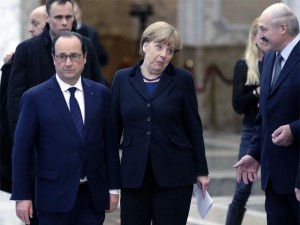The Belarusan National Platform of the EaP CSF issued a statement in connection with the wave of searches in the editorial offices of the Belarusan media and the detention of journalists.
An end for Ukraine or Eastern Partnership reboot?

Civil society representatives in Belarus and Ukraine comment on the Ukrainian demarche on the eve of the Eastern Partnership Summit in Vilnius.
It is no surprise that the decision to hamper the consolidation before signing the Association Agreement with the EU at the Eastern Partnership Summit in Vilnius has become, perhaps, the most widely discussed news these days. It seems that the matter has been settled and Ukraine was steadily stating about its determination to enter Eurointegration process, despite the pressure exerted on Ukraine from Russia as far back as this summer.
“It is obvious that this decision is a serious challenge for the Eastern Partnership program. The problems of Europeanization and Eurointegration, which are equally actual for our country, have resulted from nontransparent behind-the-scenes political games,” noted as Ulad Vialichka, the member of the Coordination Committee of the Belarusan National Platform of the EaP CSF, in the interview with the EuroBelarus Information Service. “On the one hand, it creates certain problems for the EaP program itself, as now it is absolutely unclear what will be high on the agenda during the Summit in Vilnius. On the other hand, it highlights the need for specific and purposeful actions, and above all strategy.”
Ulad Vialichka doesn’t exclude the possibility that “Ukrainian challenge will urge Europe to develop this strategy for work with the Eastern neighbours, taking into consideration both the complexity of such work and its low productiveness.”
“If we recall the start of the EaP program, EU emphasized that it is not an anti-Russian program. However, the situation we have now is a result of pressure that comes from Russia. As it is seen from the actions of Russia, Eurointegration of the countries-members of the EaP and closer relations with the EU contradicts Russian interests. And Russia does the utmost to prevent this integration.”
According to Kyryl Savin, the representative of Heinrich Böll Foundation in Ukraine, “this situation is developing so quickly that it is hard to assess the consequences today.”
“For now we can state with a certain confidence that Yanukovych won’t visit the Vilnius Summit. As even if someone from the Cabinet of Ministers will be present at the Summit, it is still not full representation. Signing of the Association Agreement could become a precedent for the other EaP countries,” Savin said. “To tell the truth, the future of the EaP is hard to predict. The program has already been living from hand to mouth, as there was no concrete content of this project except the Civil Society Forum and Ukrainian direction. This agreement should have trod the path to EU for all the remaining countries, but came to nothing and thus demonstrated its helplessness. It is the problem of crisis in the EaP program and a possibility to adopt brand new strategies that are high on the agenda.”
As to the Ukrainian President, he has two alternatives — EU and Russia. And, quite predictively, he commits himself to the bigger offer. On the other hand, too little information about Yanukoviyh-Putin talks in Moscow is available. It is very likely that tough conditions were set before Yanukovych, i.e. to become a member of the Customs Union. We don’t know the whole picture; still, before making a serious analysis, it looks as if he backed the wrong horse.
Andrei Yahorau, the head of the Centre for European Transformation, is sure that the Ukrainian decision “doesn’t end the EaP program, it only puts off Ukraine’s prospects for some time, though the EaP won’t bring it to a close.”
“There is no doubt that the methodology of the program will be reconsidered. I also hope that the mistakes Europeans have made when designing this program will be studied and thought over. Perhaps, more tools in the work with the EaP countries will be introduced. Even taking into account that Ukraine dropped out of the agenda, the Summit will still demonstrate progress. Moldova and Georgia initial Association Agreements, which is quite good result considering the EU investment in the EaP,” noted Andrei Yahorau.
Others
-
Statement of the Belarusan EaP CSF National Platform on solidarity with the civil society of Armenia
The Belarusan National Platform of the Eastern Partnership Civil Society Forum issued a statement on solidarity with the civil society of Armenia.
-
Statement of the BNP in connection with the criminal prosecution of the leaders of the Belarusan independent trade unions
The Belarusan National Platform of the Eastern Partnership Civil Society Forum issued a statement in connection with the criminal prosecution of the leaders of the Belarusan independent trade unions.
-
Final event of project CHOICE — Paving the way to European Year of Cultural Heritage 2018
The final event of the two-year EU funded project CHOICE — Cultural Heritage: Opportunity for Improving Civic Engagement was held on June 6, 2017 at the Committee of the Regions, in Brussels.
-
Heritage is a verb. The results of the CHOICE project were summarized in Minsk (Photos and video)
Does Belarus need a “Public Ministry of Culture” and “Ašmiany Charter” to deal with the historical and cultural sites?








Comments
From farewell to a new Eastern policy and towards a new development
Poland and Germany were both initiators and drivers of a New Eastern policy linked to the Eastern neighborhood and Russia/Soviet Union.